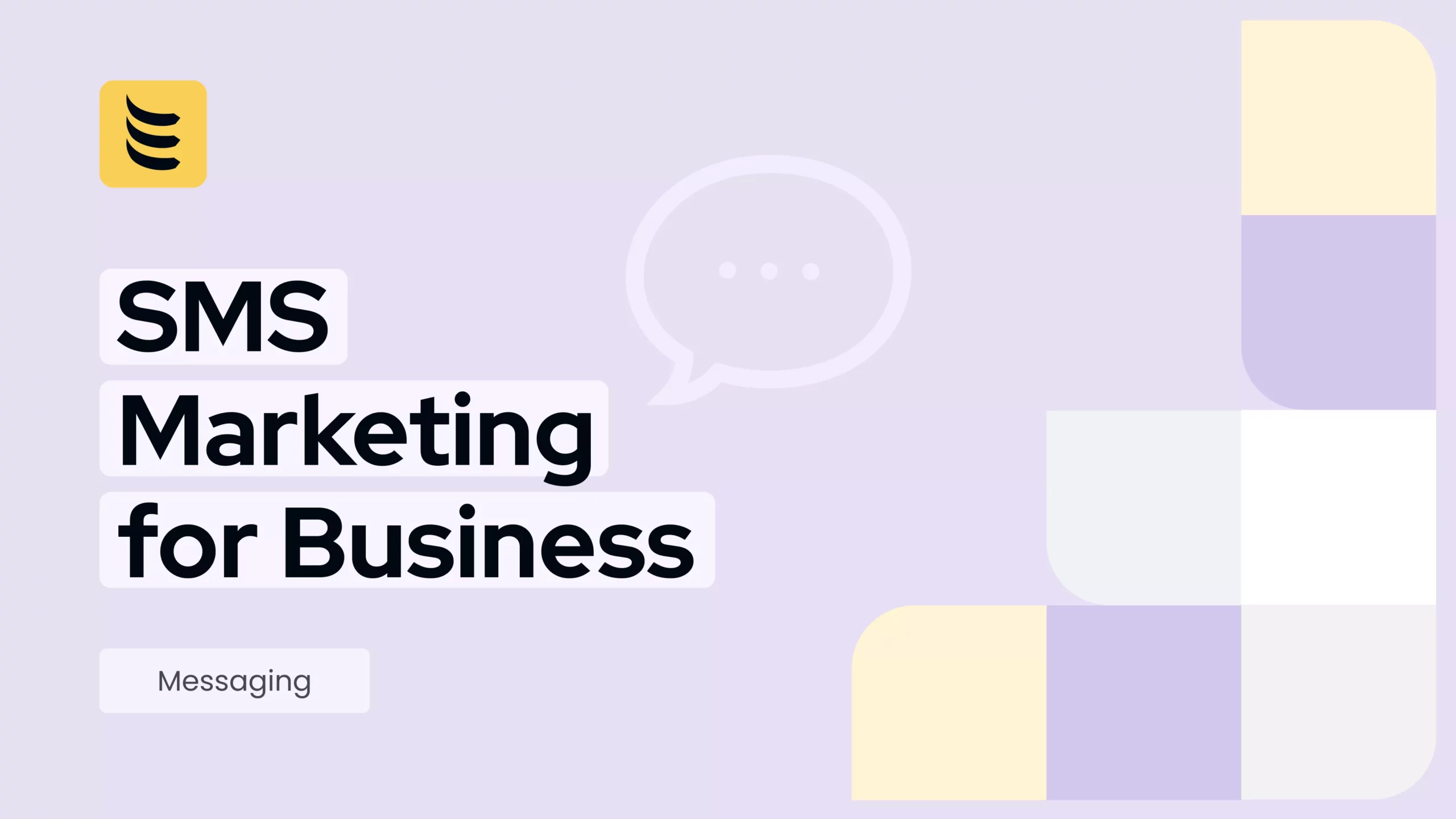Short Message Service or SMS is a technology that enables the transmission and exchange of brief text messages over cellular phone networks. This utility is supported on all mobile phones – regardless of whether they’re smartphones or conventional featured phones. SMS text does not require any specific knowledge or technical know-how, nor does it require an internet connection.
This makes text messaging ideal for enabling organizations to reach out to the largest possible population of consumers or contacts. Considering the fact that over 6.71 billion people worldwide currently use mobile phones – including some 97% of adults in the US – it’s little wonder that the concept of SMS marketing has taken hold in the commercial sector.
What is SMS Marketing?
Simply put, SMS marketing (also known as text marketing or text message marketing) is a form of marketing that organizations can use to send promotions and other information to consumers through text messages. Using SMS marketing, businesses can send messages like promotional offers, discounts, appointment reminders, and shipping notifications.
Just like commercial email promotion, SMS marketing is an opt-in system, which means that customers need to sign up for it, and give their active consent to receiving messages from each particular brand.
In contrast to email, Short Message Service communications are by definition much shorter – which contributes to the greater effectiveness of SMS messages over email. In fact, recipients open over 90% of the SMS text messages they receive, within three minutes of their arrival. Email messages tend to achieve only a 20% opening rate. This is consistent with a recent survey of business owners which found that their customers were 4.5 times more likely to reply to an SMS message than an email.

Benefits of SMS Marketing
SMS marketing confers a number of benefits on organizations that choose to use it.
They include the following:
Speedy Communication
If you limit your SMS communications to simple text (without images or multimedia elements), messages are quick and easy to produce, requiring little in the way of complex design. Provided you can get over what you want to say within a limited set of characters (typically, 160), you can craft your SMS marketing messages rapidly – and in this way, get a jump on the competition.
SMS marketing recipients will receive instant notifications on their phones – eliminating the need and the necessary delay of having to open a social media app or dedicated email client.
High Acceptance Rate
As we have observed, recipients open almost 100% of SMS text messages within three minutes of their arrival. For time-sensitive communications such as limited time offers, this makes SMS marketing an ideal medium. Moreover, with 7.3 billion people projected to have smartphones by 2026, SMS marketing opens up a potentially huge base of prospective customers.
Increased Response from Consumers
With customers 4.5 times more likely to reply to an SMS message than an email, SMS marketing opens up new avenues for customer interaction and engagement with your brand. The average response rate for an SMS marketing message is 45%, which is significantly higher than typical email click-through rates of around 7% or less. This also means that customers are much more likely to click on a link you send through SMS text.
A Complement to Other Marketing Channels
As part of an omnichannel marketing approach, SMS messaging can enhance your overall marketing efforts. For example, you can use SMS to remind customers of an upcoming event or webinar, or to promote your social media and email newsletter campaigns.
Building Customer Loyalty
With personalized and immediate communications, you can use SMS marketing to nurture relationships with your existing consumers, and to win over new ones. You can do this for example through targeted discounts and offers, or by running a VIP program.
Increasing Revenue
By driving traffic to your website or store, or promoting special sales and events, SMS marketing can contribute to your revenue stream. You can also use SMS notifications to remind customers to complete their cart purchases, helping to recover revenue that might otherwise be lost.
Form succesfully sent ;)
Best Practices for SMS Marketing
You can use the following recommendations to optimize your SMS marketing efforts:
Only Send SMS Messages to Customers Who Opt In
In the USA and Canada, legislation like the Telephone Consumer Protection Act (TCPA) stipulates privacy laws and regulations for SMS marketing. Among these are the need to get active consent from consumers, before they can receive text messages from you.
The ideal way to do this is to include an opt-in form on your website or other online channels. Opt-in messages should include your business name, to alert the recipient of who is texting before they confirm their subscription to marketing and promotional messages.
It’s a good practice to also send an initial text thanking each new subscriber and asking them to confirm opt-in with a simple reply of “Yes” or “No.”
Provide Easy Choices for Opting Out
You should make it easy for customers to stop receiving your SMS text messages by including an unsubscribe option. This can be as simple as replying “STOP” or “Unsubscribe” to your message.
Craft Concise but Punchy Messages
With a limited character set to work with, you need to introduce your brand immediately, communicate an enticing offer, and give the customer a desired course of action.
So, besides your conditions for opting in to receive SMS marketing messages and a way to opt out, your message should include your company name, the customer’s name, an enticing offer or brand promotion, and a strong call-to-action.
Target and Schedule for Maximum Impact
To help your marketing team create personalized and relevant messaging, you should segment your customers into specific categories by behavior, demographic, interest, transaction history, and other relevant criteria. You can do this by using an SMS platform like IDT Express which integrates well with your Customer Relationship Management (CRM) and other business systems – more on this, later.
In terms of message output, you’ll need to strike a balance so that you don’t overwhelm subscribers with too many messages, but don’t go silent either.
Track Your Progress
You should track the performance of each message you send. A high-end SMS marketing platform like IDT Express will include analytical tools for monitoring message response rates, click-through from links, and other relevant metrics.

Some Examples of SMS Marketing Strategies
The following are some SMS marketing strategies that you can try:
Welcome Messages for New Subscribers
When a customer subscribes to your SMS marketing campaign, you can welcome them with a simple “Thank you for subscribing!” – and show your appreciation with a discount code or special offer.
Announce New Products or Services
At strategic times (such as the start of each season), you can send out SMS notifications about new products or offerings. You can also include a link in your SMS to your store or website.
Advertise Flash and Seasonal Sales
You can send out targeted text messages promoting seasonal sales of your inventory, using your segmented customer base information.
For customers who have signed up for your loyalty program, you can use text messaging to inform them about flash or limited-time sales that only they can access via SMS.
Elicit Customer Feedback
Knowing how your customers feel about your offerings and your messaging is a great way to get the information you need to improve your products and services.
You can send a customer survey link via SMS, to learn more about what your customers expect from you. You can create a short survey using tools like Google Forms or SurveyMonkey.
Alternatively, you can ask customers to reply with a rating (from one to five). Be sure to follow up with those who give a low rating, to discover areas where you can improve.
Follow Up on Abandoned Carts
If you run an eCommerce website, you can use SMS marketing messages to send out abandoned cart notifications to customers who have left items in their online shopping carts.
Use the Right SMS Marketing Platform
To effectively craft, schedule, and monitor SMS marketing output that works, you need an SMS platform that works with and for you. And to allow SMS integration with your commonly used business systems, you’ll need an SMS API.
SMS API stands for Short Message Service Application Programming Interface, which is a set of protocols and tools that enables software applications to send and receive text messages programmatically. It allows developers to integrate SMS functionality into their own applications, websites, or systems, facilitating the automation of SMS communication.
With IDT Express SMS APIs, you can swiftly integrate IDT’s carrier-grade communications platform into your current systems or applications. Using the IDT Express SMS API, you can enable two-way communication with your customers, with a user-friendly wizard-driven code generation process that is fast and effortless to utilize.
Using IDT Express’s Bulk SMS Platform, you can run multichannel SMS marketing campaigns from a platform that offers advanced automation features, and a fallback feature that automatically switches to alternative communication channels, such as email or push notifications, if an SMS delivery fails.
With IDT Express, you can go beyond plain text and enrich your SMS messages with multimedia content. Our platform supports multimedia messaging via WhatsApp, Viber, and Facebook Messenger.
To find out more about how IDT Express can enhance your SMS marketing efforts, book a demo.




